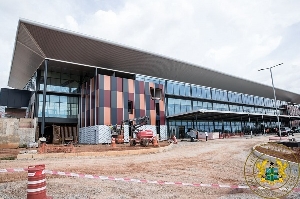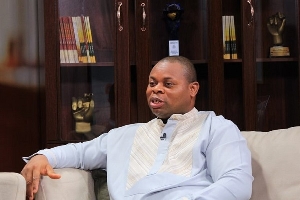- Home - News
- TWI News | TV
- Polls
- Year In Review
- News Archive
- Crime & Punishment
- Politics
- Regional
- Editorial
- Health
- Ghanaians Abroad
- Tabloid
- Africa
- Religion
- Election 2020
- Coronavirus
- News Videos | TV
- Photo Archives
- News Headlines
- Press Release
General News of Sunday, 23 January 2011
Source: NEW CRUSADING GUIDE
From The File Of Defunct Ministry Of Fisheries (2)
…Of Patrol Boats, Anti-Pair Trawling/Drug Trafficking, etc, & The Chinese Connection
SOURCE: NEW CRUSADING GUIDE
JOINT CABINET MEMORANDUM
BY THE MINISTERS FOR FISHERIES AND FINANCE & ECONOMIC PLANNING
SUBJECT:
PURCHASE OF TWO (2) 46M. PATROL BOATS FROM POLY TECHNOLOGIES INC. (PTI) OF BEIJING IN THE PEOPLE’S REPUBLIC OF CHINA
Cabinet is respectfully invited to:-
*i. grant final approval for the purchase of two (2) 46.M Patrol boats manufactured in China and supplied by Messrs Poly Technologies Inc. from Beijing, the Republic of China; and
*ii. approve of a total contract sum of USD 31, 545,647.86 for the purchase of two (2) Patrol Boats.
Cabinet will respectfully recall that at its meeting held on 13th September, 2007, it considered a memorandum submitted by the Minister for Fisheries for approval to purchase Two (2) 46M Patrol Boats from Messrs Poly Technologies (INC.) of the People’s Republic of China.
The memorandum to Cabinet argued forcefully, that Ghana’s marine coast from the East to the West appears vulnerable and that the procurement of the two (2) 46M Patrol Boats will greatly enhance the country’s defence capabilities and also help in dealing with the increasing incidence of fish poaching especially fresh Tuna fish which has led to inadequate supply of tuna fish to cannaries at Tema and the near closure of some of them and causing a considerable loss of jobs and substantial revenue.
It was also argued that smuggling of goods of all kinds in and out of the country resulting in massive revenue leakage and the distribution of narcotic drugs into the country by Drug Barons is real, while the sabotage of oil installations and stealing of crude oil when production starts are possibilities. In addition to these are the incidence of human trafficking from and through Ghana which reports indicate are on the ascendancy.
To counteract these emerging threats, government needs equally sophisticated means to deal decisively with these illegal operations and also ensure that the country’s EEZ and territorial waters are adequately protected.
By its decision conveyed through the letter Ref: OP/CA72 dated 26th September, 2007, Cabinet gave approval for the purchase of the two (2) 46M Patrol Boats recommended but added that the Ministries of Fisheries and Finance and Economic Planning should negotiate for softer terms.
Following the transmission of the above decision to Poly Technologies (INC.) the Company at its own expense invited a delegation of five (5) officials from the Ministries of Finance and Economic Planning, Fisheries and the Ghana Navy to Beijing for re-negotiation of the contract proposal and to inspect the construction of Boats at the Dalian Boats Yard at Dalian, an industrial town in the People’s Republic of China.
The delegation which was in China for one week was led by the Chief of Naval Staff, Real Admiral ARS Nuno.
At a preliminary meeting to discuss the objective of the invitation on Monday, 19th of November, 2007, the entire negotiating team comprising Ghana’s delegation and the team from Messrs Poly Technologies (INC.) were divided into two committees, namely the Price Negotiation and Technical Committees.
Essentially the terms of reference of Ghanaian representatives on the Price Negotiation Committee was to negotiate for softer terms by arguing for:
• a reduction in the rate of insurance premium since Ghana cannot be classified as a high risk area for insurance;
• a longer period for the payment of the loan;
• the alteration of the management fees with more emphasis on a lower deposit to be paid by the Government of Ghana;
• a longer period of moratorium for the payment of the loan; and
• soft concessional terms, that is the Grant element of the loan should be strongly canvassed.
Ghanaian members on the Technical Committee were also to:-
• Look for appropriate vessel design for our type of waters which is Atlantic
• Look for a Patrol boat with good communication equipment system and good radar detection system with an appropriate nautical speed for coastal duties and marine protection;
• Look for coast effective maintenance; and
• Ensure availability of adequate back-up spare parts especially the fast moving spares; and
• A Boat which can accommodate a crew of 30 instead of 24 to facilitate day and nigh shift system and arrangement
A summary of the outcome of the meeting which resulted to an increase in the cost of the boast from USD 23,208,000.00 to USD 31,545,647.87 is as indicated below:
*(i) After several deliberations, the technical requirements for the boats were upgraded. For instance, the team requested for the size of a boat which can accommodate a crew of 30 persons instead of the original 24. Also upgraded was the capacity of the weaponry items of the boat and an increase in the spare parts requirement.
*(ii) Due to the appreciation of the RMB and an average of 24% price hike on raw materials for the manufacture of the boat over the past two (2) years, the teams after negotiation accepted a 12.5% price increase on the FOB value of the gun boat.
*(iii) The validity of the current price will be four (4) months from the date of the signing of the minutes.
*(iv) As a gesture of goodwill, the Chinese side requests for an insurance rate of 5% instead of the 5.4% Chinese Government rule for foreign loan.
*(v) The deferred payment period for the 80% contract CIF value plus interest rate shall be four years, with one year grace period.
*(vi) The Chinese side agreed to cover USD 900,000.00 of the total increase in freight charge and to fix the charge at USD 1,600,000,00 for the two (2) boats.
The total contract value is USD31,545,647.86, which consists of the following:
*a. Total Net Principal Amount: USD27,038,180.00 CIF TEMA PORT GHANA:
*b. Management fee of USD216,305.44, which is 1% of 80% of the Total Net Principal Amount
*c. Credit insurance premium of USD1,081,527.20, which is 5% of the 80% of the Total Net Principal Amount.
The breakdown of the price list for the Total Net Principal Amount (USD CIF TEMA GHANA): of USD27,038, 180.00 is indicated as per the table below:
S/N ITEM UNIT COST (USD) QUANTITY TOTAL COST (USD)
1. FOB Value (include sea-borne spare parts 12,020, 000.00 2 24,040,000.00
2. Additional Spares 100,000.00 2 200,000.00
3. Ammunition (5,000 rounds of 14.5mm bullets and 10,000 rounds of 12.7mm bullets) 29,000.00 2 58,000.00
4. Sea Freight 800,000.00 2 1,600,000.00
5. Freight Insurance 49,040.00 2 98,080,00
6. Production Supervision, Training, Shipyard Inspection, Installation & Commissioning 1.042,100.00
Total Net Principal Amount (USD CIF TEMA GHANA) 27,038,180.00
A copy of the agreed minutes of the series of meetings at which the softer terms on vital items in the contract were negotiated by the two parties is hereby attached for your information as appendix ‘A’.
*A SUMMARY OF THE REASONS FOR NON FULL CONCESSIONARY OFFER:
Even though PTI acknowledged Ghana’s position in requesting for a fully concessional loan, it maintains that the rules for giving concessionary loans are very clear and that the supply of military or quasi-military equipment do not qualify. In some cases an argument can be made that the item being supplied is not military because it will basically be used by the Ministry of Fisheries. However, the proposed use of the equipment is also used to define it’s status but in this case, the boats will definitely carry weapons.
Therefore, it is not possible to disguise the vessel as non-military because it is going to be used for EEZ patrol, Conduct Marine Surveillance and to police the country’s territorial waters.
With regard to the duration of the loan Poly Technologies advanced two reasons for keeping the repayment period at four years:-
*i. PTI maintains that although it quotes its prices in US dollars to the world outside China, it buys most of its raw materials in China with their local currency (the RMB), therefore any increases in the value of the RMB vis-à-vis the US dollar go straight to affect its cost build up. Meanwhile by state policy there is immense pressure on China to allow its currency to appreciate against the USA and European currencies. A loan with a long repayment period will lead to severe losses. For instance when they made their first offer to the Ministry of Fisheries the RMB stood at US$1/RMB8.3, at the time of renegotiation it was US$1/RMB7.45 and PTI expects it to drop to roughly US$1/RMB6 within the next two years.
*ii. Another major problem is the escalating price of steel and crude oil on the international commodities market. If this contract is agreed they can buy in advance the steel the factory will require for the construction of the boats hence the need for the Government to agree to the purchase of the vessels within the next three months to avoid an increase in price. The high cost of crude oil will directly affect the shipping cost of the vessels when they are completed, and since PTI cannot negotiate freight charges in advance, the value of the freight in RMB in two (2) years will mostly likely be vastly different than in four (4) years and therefore agreeing to absorb the additional freight will affect the viability of PTI. For instance when the first offer was made to the Ministry of Fisheries the freight charges for one vessel was US$664,900 (US$1,329,800 for the two vessels) at the time of renegotiation it had moved to US$1,250,000 (US$2,500,000 for the two vessels), increasing the total price by US$1,170,200.
Poly Technologies maintains that although it is prepared to break even, it does not want to make huge losses arising from the sale of the vessels. It believes that its offer though not fully concessionary, it is closely concessionary in view of the following reasons:-
*i. Despite the fact that increases in the cost of raw materials and appreciation of the RMB since the first offer was made had led to an average increase in the price of each vessel by 24%, PTI has decided to increase its price by only 12.5%
*ii. The interest rate has been fixed at 5.9% for the duration of the loan instead of the libor + 1 in the first offer. It is important to note that the rate requested is already 0.5 -1% lower than the prevailing USD loan interest in China.
*iii. Cancelling of the arrangement and management fee totaling 2% and replacing it with a 1% management fee.
*iv. PTI is prepared to cover US$800,000 of the US$1,170,200 increase in the freight charges and fix the price rather than quote FOB which will push the burden of a most likely increase cost come shipping time on completion of the vessels to Ghana.
*v. PTI has agreed to a one year moratorium despite the fact that they will have to make full payment to the factories to be engaged to build the vessels and supply them within 18 months.
* Although, a fully concessional loan has not been secured for the purchase of the vessels, we must not lose sight of the fact that, for the size of the vessel and the equipment on board, the price given makes it a good buy. Moreover, the benefit of owning these vessels more than offsets the losses we incure daily from poaching of our fish, the loss of national pride from the embarrassment caused by drug smugglers, human traffickers and the capacity needed as a country to provide security to protect the country’s drilling equipment, machinery and the crude oil itself in our territorial waters.
It is the view of the two Ministries that the terms of the loan are competitive and therefore merit consideration and acceptance.
Finally, we wish to point out that the delay in concluding the sale agreement is likely to affect the cost of the patrol boats if the agreement for the purchase of the vessels is not signed within the coming four months because prices of commodities keep increasing.
Cabinet is on the basis of the above stated narration, argument and reasons respectfully invited to give the final approval and go ahead for the contract between Ghana and PTI to be concluded and signed.
HON. KWADWO BAAH-WIREDU (MP) HON. MRS. GLADYS ASMAH (MP)
MINISTER FOR FINANCE & MINISTER FOR FISHERIES
ECONOMIC PLANNING
December, 2007










